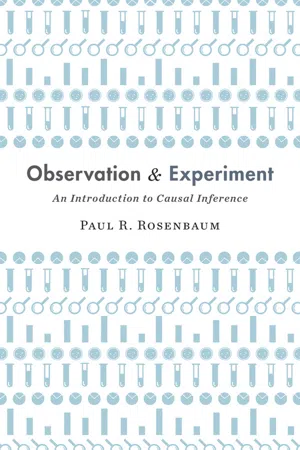
- English
- PDF
- Available on iOS & Android
About this book
A daily glass of wine prolongs life—yet alcohol can cause life-threatening cancer. Some say raising the minimum wage will decrease inequality while others say it increases unemployment. Scientists once confidently claimed that hormone replacement therapy reduced the risk of heart disease but now they equally confidently claim it raises that risk. What should we make of this endless barrage of conflicting claims?
Observation and Experiment is an introduction to causal inference by one of the field's leading scholars. An award-winning professor at Wharton, Paul Rosenbaum explains key concepts and methods through lively examples that make abstract principles accessible. He draws his examples from clinical medicine, economics, public health, epidemiology, clinical psychology, and psychiatry to explain how randomized control trials are conceived and designed, how they differ from observational studies, and what techniques are available to mitigate their bias.
"Carefully and precisely written…reflecting superb statistical understanding, all communicated with the skill of a master teacher."
—Stephen M. Stigler, author of The Seven Pillars of Statistical Wisdom
"An excellent introduction…Well-written and thoughtful…from one of causal inference's noted experts."
—Journal of the American Statistical Association
"Rosenbaum is a gifted expositor…an outstanding introduction to the topic for anyone who is interested in understanding the basic ideas and approaches to causal inference."
—Psychometrika
"A very valuable contribution…Highly recommended."
—International Statistical Review
Frequently asked questions
- Essential is ideal for learners and professionals who enjoy exploring a wide range of subjects. Access the Essential Library with 800,000+ trusted titles and best-sellers across business, personal growth, and the humanities. Includes unlimited reading time and Standard Read Aloud voice.
- Complete: Perfect for advanced learners and researchers needing full, unrestricted access. Unlock 1.4M+ books across hundreds of subjects, including academic and specialized titles. The Complete Plan also includes advanced features like Premium Read Aloud and Research Assistant.
Please note we cannot support devices running on iOS 13 and Android 7 or earlier. Learn more about using the app.
Information
Table of contents
- Cover
- Contents
- Preface
- Reading Options
- List of Examples
- Part I. Randomized Experiments
- Part II. Observational Studies
- Appendix: Bibliographic Remarks
- Notes
- Glossary: Notation and Technical Terms
- Suggestions for Further Reading
- Acknowledgments
- Index